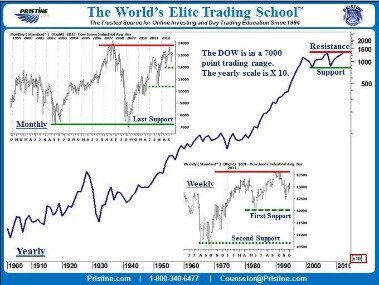Bearish Harami
Contents:

The bearish harami is supposed to act as a bearish reversal, but testing shows that it is a bullish continuation pattern 53% of the time. Once price breaks out, the trend is not an exciting one. Looking at the various combinations of bull/bear and up/down markets, the price change over 10 days is less than half the 6% I consider good.

Although this bearish harami happened to breakout upward shortly before a downturn, the setup is correct. In other words, for the best results as a reversal candle, look for the bearish harami to appear at the top of an upward retrace in a downward price trend. When price breaks out downward, it rejoins the existing primary trend and price tends to drop. Finally, it is crucial to use other analyses and indicators alongside the hamari cross pattern. Such a strategy is often an indicator for traders of a trend reversal.
Dark Cloud Cover Candlestick Pattern: The Ultimate Guide
The bullish harami indicator is charted as a long candlestick followed by a smaller body, referred to as a doji, that is completely contained within the vertical range of the previous body. To some, a line drawn around this pattern resembles a pregnant woman. The word harami comes from an old Japanese word meaning pregnant. A bullish harami is a basic candlestick chart pattern indicating that a bearish trend in an asset or market may be reversing. Since the bullish harami is a pattern that can be used to identify reversals in trends, you should confirm that the price has indeed reversed by observing other momentum indicators.
Watch this video to learn more about how to identify and trade the bullish harm pattern. Live streams Tune into daily live streams with expert traders and transform your trading skills. Though i understood engulfing piercing and harami pattern, it would be nice to illustrate the differences amongst them as three are quiet similar. The harami pattern evolves over 2 trading sessions – P1 and P2.
How does the Harami pattern look in real life?
The body of the white candle is inside the body of the black candle. A bearish pattern shows a potential future downward trend. It occurs after an upward trend with a long upward candle meaning the buyers are in control. The upward candle is then followed by a doji which, similarly to before, must be within the previous candle’s length.
Japanese candlestick trading guide – IG
Japanese candlestick trading guide.
Posted: Fri, 04 Sep 2020 11:58:55 GMT [source]
Usually, the second candlestick will be the opposite color of the first candlestick, but not always. The second candle must be contained within the first candle’s body . It can be either color, and it will have a smaller body. Only the body needs to be contained within the first candle; the wicks are irrelevant. There is a prevailing trend, whether it’s an uptrend or a downtrend.
How to Trade a Bullish Harami Pattern?
Unique to Barchart.com, data tables contain an option that allows you to see more data for the symbol without leaving the page. Click the “+” icon in the first column to view more data for the selected symbol. Scroll through widgets of the different content available for the symbol. The “More Data” widgets are also available from the Links column of the right side of the data table.
The wicks on the small-bodied candlestick must also be within the first candlestick. I’ll also give you the three quick steps to make this pattern easier for you to understand and trade. It’s basically an inside bar with a small range, and sometimes it can be large, as you have seen earlier.
Learn about crypto in a fun and easy-to-understand format. If you are day trading, the Daily Pivot Points are the most popular, although the Weekly and Monthly are frequently used too. Here are a few strategies to trade the Bearish Harami pattern. A Bearish Harami appearing after this bullish move is a sign of a possible reversal to the downside. What makes a pattern valid is not just the shape, but also the location where it appears. Keep in mind all these informations are for educational purposes only and are NOT financial advice.
Investors seeing this bullish harami may be encouraged by this diagram, as it can signal a reversal in the market. Certain techniques can aid the harami cross pattern and hopefully reduce the risk-reward of the investment. Since the bullish harami is a trend reversal pattern, you want to confirm the reversal with another momentum indicator. The MACD and RSI are two of the most important momentum indicators that you can use when identifying the bullish harami pattern. The first candle is usually long, and the second candle has a small body. The second candle is generally opposite in colour to the first candle.
This is what you learned today
The three black crows is a 3-bar bearish reversal patternThe pattern consists of 3 bearish candles opening above the… An evening star pattern is a bearish 3-bar reversal candlestick patternIt starts with a tall green candle, then a… The default “Intraday” page shows patterns detected using delayed intraday data. It includes a column that indicates whether the same candle pattern is detected using weekly data. Candle patterns that appear on the Intradaay page and the Weekly page are stronger indicators of the candlestick pattern. Risk capital is money that can be lost without jeopardizing ones financial security or life style.
The trend channel offers context from a price action angle. The MACD divergence relies on the concept of price momentum. After breaking the bearish trend line, the market meandered for a period. It plummeted past the 200% line and seemed to have found support at the 300% line.
Apple’s bearish ‘harami cross’ warns of trend reversal – MarketWatch
Apple’s bearish ‘harami cross’ warns of trend reversal.
Posted: Thu, 13 Oct 2016 07:00:00 GMT [source]
The frequency rank is 25, which means the candle pattern should be plentiful in a historical price series. The overall performance rank of 38 is decent but not outstanding. If a bearish harami cross and the trader are entering a short position, they can place a stop-loss above the original candlestick. Similarly, if the trend does not switch, the investor will incur less loss. “Take profit” targets can also be used to help traders exit a trade profitably. The harami cross pattern does not show profit targets through such a strategy.
Harami Candlestick Pattern: Definition and Strategies
To be included in a Candlestick Pattern list, the stock must have traded today, with a current price between $2 and $10,000 and with a 20-day average volume greater than 10,000. The MACD crossover confirms the bullish trend before the pattern occurs, providing strong evidence that momentum is overextended. The technical storage or access is required to create user profiles to send advertising, or to track the user on a website or across several websites for similar marketing purposes.
Top 10 Candlestick Patterns To Trade the Markets – DailyFX
Top 10 Candlestick Patterns To Trade the Markets.
Posted: Wed, 06 Feb 2019 08:00:00 GMT [source]
Second, you should then look https://trading-market.org/ly at the movement of the candlesticks and identify when a large candlestick is followed by a small candle. For the pattern to happen, the smaller candle must be completely engulfed by a larger one. A doji is a trading session where a security’s open and close prices are virtually equal. It can be used by investors to identify price patterns.
In this, you will be waiting for confirmation that the reversal will happen. A bullish belt hold is a single bar Japanese candlestick pattern that suggests a possible reversal of the prevailing downtrend. As a bearish reversal pattern, the Bearish Harami is a great pattern to watch for when the price is on a downtrend. To trade the Bearish Harami candlestick pattern it’s not enough to simply find a series of candles with the same shape on your charts.
There should not be much followthrough in the direction of the first candlestick. If the market pushes decisively beyond the first candlestick of the Harami, skip it. The more price movement in the second candle, the stronger your signal will be.
The Bearish Engulfing pattern is a two-candlestick pattern that consists of an up candlestick followed by a large down candlestick that surrounds or “engulfs” the… In a downtrend, it means that sellers have failed to close the second candlestick near the low of the previous candlestick. Another thing you can see is that the two candles have an upper and lower shadow. Additionally, the harami candles have a close resemblance to an engulfing candle. The only difference is that in an engulfing, the smaller candle is usually followed by the bigger candle.
The next day a white candle should be nestled within the body of the prior candle. The tops or bottoms of the bodies can be the same price, but not both. In Chart 2 above, a buy signal could be triggered when the day after the bullish Harami occurred, the price rose higher and closed above the downward resistance trendline. A bullish Harami pattern and a trendline break is a combination that could result in a buy signal.
In fact, the bestperformance 10 days after the breakout is a drop of 4.01% in a bear market. The drop ranks 50th out of 103 candle patterns, or about mid range. Today, traders mostly use candlestick charts to make informed trading decisions based on recurring patterns, which tend to forecast a market’s short-term direction. As you can see in the GBP/USD chart above, the first bearish candle has a longer body and appears at the bottom of a downtrend.
Like other Japanese patterns can be bullish or bearish. The Harami Candlestick Pattern is considered a trend reversal pattern that can either be bullish or bearish, depending on the direction of the price action. A Japanese rice trader named Munehisa Homma developed candlestick charts in the 18th century. He noticed that although there was a correlation between supply and demand and the price of rice, traders’ emotions also had a great influence on markets. Using a variety of colors to visually represent price changes’ magnitude, he used candlesticks to reflect this emotion and investor sentiment. In terms of meaning, both patterns indicate that the price is about to reverse.
- Candle patterns that appear on the Intradaay page and the Weekly page are stronger indicators of the candlestick pattern.
- When combined, a bearish Harami pattern and a trendline break might be interpreted as a potential sell signal.
- The second candle is generally opposite in colour to the first candle.
- Unique to Barchart.com, data tables contain an option that allows you to see more data for the symbol without leaving the page.
A market that’s testing the 300% line has a high chance of being overextended. Hence, it was reasonable to consider a bullish reversal setup. Many traders have heard about the harami pattern, but few actually know how to trade it.
On the appearance of the harami pattern, a trend reversal is possible. There are two types of harami patterns – the bullish harami and the bearish harami. Trading with the bullish and bearish harami candlesticks is relatively simple.
When you look at the bullish harami candlestick pattern it represents two candlesticks. The first one being quite large and the second one significantly smaller. Also the second candlestick is contained within the body of the first candlestick.
Analysts looking for fast ways to analyze daily market performance data will rely on patterns in candlestick charts to expedite understanding and decision-making. Futures and forex trading contains substantial risk and is not for every investor. An investor could potentially lose all or more than the initial investment.






